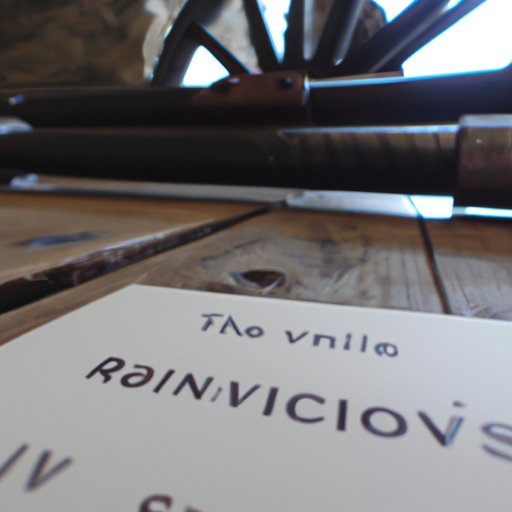An Overview of Inventions During the Industrial Revolution
The Industrial Revolution, which took place from the mid-18th century to the mid-19th century, was a period of significant change in the way goods were produced and consumed. The revolution marked a shift from manual labor to machine-based production and ushered in an era of immense technological progress. This period saw the invention of many new products, processes, and technology that transformed the way people lived and worked.
Some of the key inventions and innovations of the Industrial Revolution include the steam engine, mechanical looms, the spinning jenny, interchangeable parts, and the telegraph. These inventions had a huge impact on society and the economy, leading to increased productivity, improved quality of life, and the emergence of new industries.
A Timeline of Innovations that Changed the Course of History
The Industrial Revolution began in Britain and spread to other countries, but its roots can be traced back to earlier periods in history. During the pre-industrial era, inventors had already begun to develop new tools and technologies that would later become important components of the industrial process.
Pre-Industrial Revolution Inventions
Throughout the 1700s, the concept of the factory system was slowly taking shape. This was due in part to the invention of several key pieces of technology developed during this period. The flying shuttle, invented by John Kay in 1733, was one of the first machines to increase weaving productivity. The water frame, invented by Richard Arkwright in 1769, was a precursor to the modern spinning machine. And the seed drill, invented by Jethro Tull in 1701, revolutionized agricultural practices. These inventions laid the groundwork for the industrialization of the textile industry.
Early Industrial Revolution Inventions
By the late 1700s, the Industrial Revolution was in full swing. In 1764, James Watt invented the steam engine, which became the primary source of power for factories and mills. In 1785, Edmund Cartwright designed the power loom, a mechanized version of the hand loom. Other important inventions of this period include the cotton gin, invented by Eli Whitney in 1793, and the threshing machine, invented by Andrew Meikle in 1784.
Later Industrial Revolution Inventions
In the early 1800s, the pace of innovation accelerated even further. In 1804, Richard Trevithick invented the locomotive, which revolutionized transportation. In 1809, Samuel Crompton invented the spinning mule, which combined the features of the spinning jenny and the water frame. In 1856, Henry Bessemer invented the Bessemer process, which allowed for the mass production of steel. These inventions made it possible for factories to produce more goods faster and cheaper than ever before.

Exploring the Impact of Industrial Revolution Inventions
The inventions of the Industrial Revolution had a profound impact on the world. Not only did they lead to economic growth and social change, but they also enabled technological advancements that shaped the modern world.
Economic Growth
The inventions of the Industrial Revolution led to rapid economic growth. According to research from the University of Cambridge, “the rate of economic growth over the period of the Industrial Revolution was unprecedented and unparalleled in human history.” This growth was driven by increased productivity, as factories were able to produce more goods at a faster rate. This enabled businesses to create more jobs and make higher profits, which in turn helped spur further economic development.
Social Changes
The inventions of the Industrial Revolution also had a major impact on society. The rise of factories led to the emergence of a new class of workers, known as the proletariat. This class was largely composed of unskilled laborers who worked long hours in dangerous conditions for low wages. This led to the rise of organized labor movements, which fought for better working conditions and higher wages.
Technological Advancements
The inventions of the Industrial Revolution also enabled new technologies that continue to shape the world today. In particular, the invention of the steam engine paved the way for automation, mass production, and transportation.

The Technological Advances That Shaped the Modern World
The invention of the steam engine led to several technological advances that helped shape the modern world.
Automation
The steam engine enabled the widespread use of automation in factories. Machines powered by steam could perform tasks faster and more efficiently than humans, and they could operate without stopping. This allowed factories to produce goods at a much faster rate than ever before, leading to increased productivity and profits.
Mass Production
The steam engine also enabled the mass production of goods. Manufacturers were now able to produce large quantities of goods quickly and cheaply, making them available to a wider range of consumers. This led to a surge in consumer spending, which helped drive economic growth.
Transportation
The invention of the steam engine also made it possible to power vehicles, such as ships and locomotives. This revolutionized transportation, as goods could now be transported over longer distances in less time. This enabled businesses to expand their operations and reach new markets, leading to increased profits and economic growth.

How the Inventions of the Industrial Revolution Transformed Society
The inventions of the Industrial Revolution had a profound impact on society. Not only did they lead to economic growth and social change, but they also enabled technological advancements that continue to shape the world today.
Increased Productivity
The inventions of the Industrial Revolution led to increased productivity. Machines powered by steam were able to produce goods faster and more efficiently than ever before, leading to higher profits for businesses. This allowed companies to hire more workers and pay them higher wages, which in turn led to increased economic growth.
Improved Quality of Life
The inventions of the Industrial Revolution also led to improvements in the quality of life. Mass production made goods more affordable and accessible, while improved transportation allowed people to travel farther and faster than ever before. This enabled people to explore new opportunities and experience a higher standard of living.
Emergence of New Industries
The inventions of the Industrial Revolution also created new industries. For example, the invention of the steam engine led to the emergence of the railway industry, while the invention of the cotton gin enabled the development of the cotton industry. These industries provided jobs for thousands of people and helped fuel economic growth.
The Pioneers Behind the Industrial Revolution Inventions
The inventions of the Industrial Revolution were made possible by the hard work and ingenuity of a few pioneering individuals. Here are three of the most influential inventors of the Industrial Revolution:
James Watt
James Watt is widely regarded as the father of the Industrial Revolution. He is best known for his invention of the steam engine, which revolutionized transportation and enabled the widespread use of automation in factories. His inventions paved the way for the modern industrial age.
Eli Whitney
Eli Whitney is best known for his invention of the cotton gin, which revolutionized the cotton industry. His invention enabled the mass production of cotton, leading to increased profits for businesses and improved living standards for workers.
Henry Bessemer
Henry Bessemer is best known for his invention of the Bessemer process, which allowed for the mass production of steel. His invention revolutionized the steel industry and enabled the manufacturing of a wide range of products, from bridges to automobiles.
The inventions of the Industrial Revolution had a profound effect on the world. They enabled economic growth, social changes, and technological advancements that continue to shape the modern world. These inventions were made possible by the hard work and ingenuity of the pioneers behind them, who forever changed the course of history.
(Note: Is this article not meeting your expectations? Do you have knowledge or insights to share? Unlock new opportunities and expand your reach by joining our authors team. Click Registration to join us and share your expertise with our readers.)
